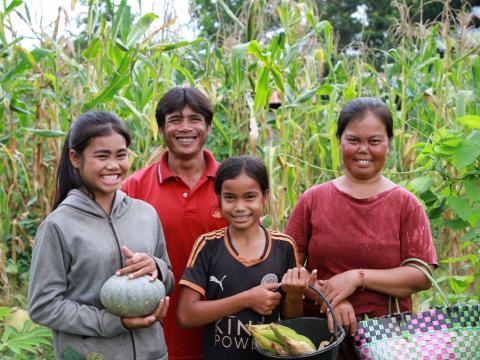Plant a seed, grow better living conditions

Field, forest and farms provide food for families in Nakhandai village - but it’s not always enough. From dawn till dusk, thirty-nine-year old Sysavanh and his wife Tum both work in the fields under the hot sun or in the forest looking for food. They need to feed their two children; their first daughter Toon, thirteen years old, who is studying in secondary school year 3, and Youm, ten years old, secondary school year 1 student.
“I usually wake up very early and head to the forest in search of food, often not returning home until noontime. It saddens me to leave my children at home alone. It’s a difficult situation but without food to eat…I have not much choice” Sysavanh’s wife shared.
Their main occupation was growing rice, and even with countless hours spent laboring in the rice field or forest, the family faces frequent food shortages. “In years when the rice harvest is good, our family has enough food for about 8 months out of the year. Some years our farm is affected by floods, so we remain hungry,” Sysavanh said.
In 2020, Sysavanh’s family was selected to participate in the home garden activity of the Building Secure Livelihood (BSL) project led by World Vision, along with 12 other vulnerable families suffering from malnutrition. At first, it was difficult to sit inside a classroom all day because he was used to working long hours outside. When the trainer spoke of growing lettuce, cucumber, long green been, corn, onion, chilies and other new vegetables, Sysavanh suddenly became more interested in the session; but he was a bit worried because his family didn't have any materials to start.
“I have attended the training on home garden for two times, where I learnt home gardening techniques, making organic fertilizer and taking care of the crops” Sysavanh’s shared.
Sysavanh was eager to try these new farming techniques. World Vision provided his family with a water pail, vegetable seeds and all the necessary equipment to build and maintain a home garden.
“Now, since establishing our home garden, my family has more nutritious foods to eat. My wife and I no longer worry about what we will feed our children, and we do other things instead of foraging in the forest,” Sysavanh said.
The BSL project aim is to reduce child malnutrition and help families produce enough food for the whole year. Through this initiative, families are able to enjoy life a little more knowing their children have enough healthy food to eat: “This garden not only allows our family to have more food to eat, but it also allow us to earn a new income from selling vegetable” says Tum.
Having mastered running their home garden, Sysavanh’s family starts raising chickens, ducks, goats and opened a small grocery store in their house where they also sell gasoline as a source of income and food. Thankful for all the support received by the project, the serene couple is now heading towards the future: “I am happy that we have more food for our children than before. It is my dream to see my children grow up healthy, become successful in their studies and get a good job, so that they can be able to take care of themselves. I don’t want my children to be like me in the future” Tum says.